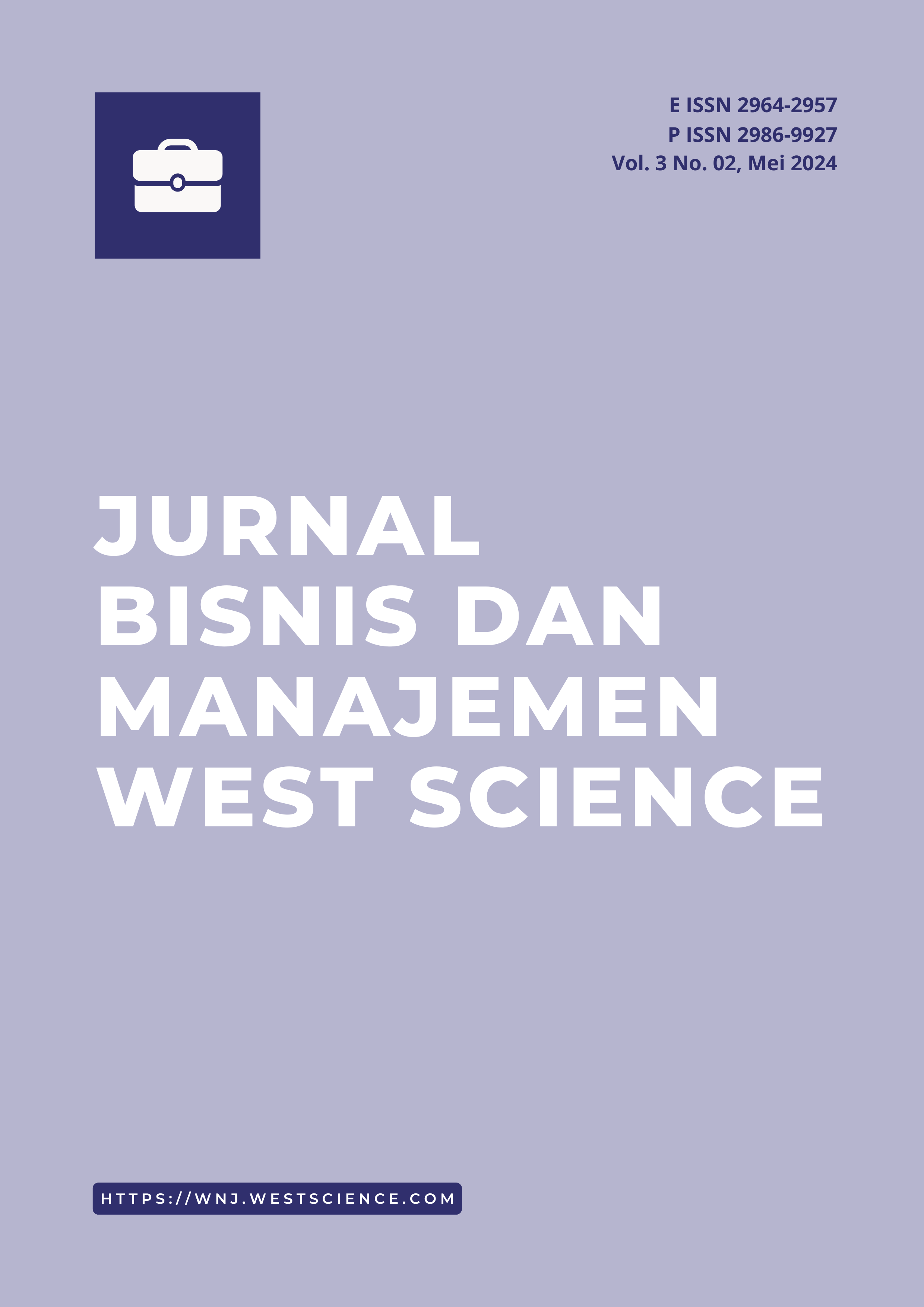Finansial Inklusi dan Akses Kredit untuk UMKM: Sebuah Analisis Bibliometrik
DOI:
https://doi.org/10.58812/jbmws.v3i02.1158Kata Kunci:
Inklusi keuangan, Akses Kredit, Analisis Bibliometrik, VOSviewerAbstrak
This study conducts a bibliometric analysis to explore the research landscape of financial inclusion, analyzing thematic clusters, research trends, author collaboration networks, and identifying potential areas for future research. Utilizing VOSviewer for network visualizations, we examine data from key publications spanning several decades to determine how research foci have evolved. Our findings reveal that research on financial inclusion encompasses a diverse range of themes, including core financial services, digital finance, microfinance, and the socioeconomic impacts of financial accessibility. Trends indicate a progressive shift towards integrating digital solutions and sustainability into financial practices. Author collaboration analysis highlights a robust network of scholars, with significant contributions from leading figures in the field. The study also identifies under-researched areas such as gender-specific financial inclusion and sustainable finance, presenting opportunities for future explorations. These insights contribute to understanding the dynamic and multidimensional nature of financial inclusion research, highlighting its role in fostering economic development and addressing global challenges.
Referensi
Anthanasius Fomum, Tita, and Pieter Opperman. 2023. “Financial Inclusion and Performance of MSMEs in Eswatini.” International Journal of Social Economics 50(11): 1551–67. https://doi.org/10.1108/IJSE-10-2020-0689.
Artha, Bhenu et al. 2023. “Keuangan Digital: Suatu Studi Literatur.” Entrepreneurship Bisnis Manajemen Akuntansi (E-BISMA): 84–91.
Banerjee, Abhijit, Esther Duflo, and Michael Kremer. 2020. “The Influence of Randomized Controlled Trials on Development Economics Research and on Development Policy.” In , 439–87.
Chavriya, Shubham, Gagan Sharma, and Mandeep Mahendru. 2023. “Financial Inclusion as a Tool for Sustainable Macroeconomic Growth: An Integrative Analysis.” Annals of Public and Cooperative Economics 95.
Claessens, Stijn, and Leora Klapper. 2005. “Bankruptcy around the World: Explanations of Its Relative Use.” American Law and Economics Review 7: 253–83.
Dai, Debao, Mingzhu Fu, Liang Ye, and Wei Shao. 2023. “Can Digital Inclusive Finance Help Small- and Medium-Sized Enterprises Deleverage in China?” Sustainability 15: 6625.
Esowe, Susannash Limunga. 2023. “Financial Inclusion and Its Impact on Poverty Alleviation amongst Micro and Small Enterprises in Cameroon.” Business and Economic Research 13(2): 170.
Ewuraba Adua Nkansah-Sakyi. 2023. “Review on the Impact of Financial Institutions’ Systems on SMEs’ Access to Finance.” CEMJP 31(2 SE-Articles): 304–10. http://journals.kozminski.cem-j.org/index.php/pl_cemj/article/view/702.
Guo, Yu, Pengfei Li, and Chenxi Xiao. 2023. “Research on Digital Inclusive Finance to Alleviate the Dilemmas of SME Financing and Countermeasures.” Highlights in Business, Economics and Management 7: 399–401.
Kasiisii, Athikho Stephen, Siluvaimuthu Mariadoss, and Selvaraj Anthony Rahul Golden. 2023. “The Effectiveness of Digital Financial Inclusion in Improving Financial Capability.” International Journal of Professional Business Review 8(5): e0839.
Kerthayasa, I Wayan, and Ni Putu Ayu Darmayanti. 2023. “Pengaruh Literasi Keuangan Dan Financial Technology Terhadap Inklusi Keuangan Di Desa Pengotan.” E-Jurnal Manajemen Universitas Udayana 12(2): 137.
Khaleq, Shatha Yousef Abdel, and Ruba Nimer Abu Shihab. 2024. “The Impact of Financial Inclusion on Economic Growth: ARDL Approach.” WSEAS Transactions on Business and Economics 21(2): 371–81.
Li, Jixuan, and Jiayu Huang. 2023. “A Study on the Impact of Digital Inclusive Finance on Business Innovation- Financing Constraints as a Mediating Variable.” Highlights in Business, Economics and Management 12: 243–52.
Oladipo, Adenike et al. 2023. The Trend of Financial Inclusion: A Comparative Analysis of Selected African Countries.
Saifurrahman, Adi, and Salina Kassim. 2023. “Enhancing the MSME Islamic Financial Inclusion in Indonesia: An Institutional Theory Perspective.” 23: 6–25.
Samputra, Palupi Lindiasari, and Nining Indroyono Soesilo. 2023. “Evaluation of National Financial Inclusion Strategies in Non-Profit Institution: SME Center UI.” Jejak 16(1): 116–34.
Simba, Amon, Mahdi Tajeddin, Leo-Paul Dana, and Domingo Soriano. 2023. “Deconstructing Involuntary Financial Exclusion: A Focus on African SMEs.” Small Business Economics 62.
Spilbergs, Aivars. 2023. “Financial Services Digitainability: Financial Inclusion and Efficiency in EU Countries.” WSEAS Transactions on Business and Economics 20: 1448–62.
Thathsarani, Shanika, Wei Jianguo, and Mona Alariqi. 2023. “How Do Demand, Supply, and Institutional Factors Influence SME Financial Inclusion: A Developing Country Perspective.” SAGE Open 13.
Togun, O R, Ranti Ogunrinade, Ola T Olalekan, and T D Jooda. 2022. “Financial Inclusion and SMEs’ Performance: Mediating Effect of Financial Literacy under the Creative Common Attribution Non-Commercial 4.0.” Journal of Business and Environmental Management (JBEM) 1(1): 23–33. https://journals.airsd.org/index.php/jbem.
Trianto, Budi, Rahmayati Rahmayati, Tetty Yuliaty, and Tasiu Sabiu. 2021. “Determinant Factor of Islamic Financial Inclusiveness at MSMEs: Evidence from Pekanbaru, Indonesia.” Jurnal Ekonomi & Keuangan Islam 7: 105–22.
Zhang, Lu, Jiakui Chen, Ziyi Liu, and Zhiyuan Hao. 2023. “Digital Inclusive Finance, Financing Constraints, and Technological Innovation of SMEs—Differences in the Effects of Financial Regulation and Government Subsidies.” Sustainability 15: 7144.
Unduhan
Diterbitkan
Cara Mengutip
Terbitan
Bagian
Lisensi
Hak Cipta (c) 2024 Loso Judijanto

Artikel ini berlisensiCreative Commons Attribution-ShareAlike 4.0 International License.



















 Instagram
Instagram 